Greetings!
Dev Diary #100, and we have a bunch of fun things to talk about!
DUELS
As we have mentioned before, duels have been reworked during this development cycle, along with some other systems that tie into it. First off, Personal Combat Ratings now more commonly range between something like 1-100, and traits and other modifiers have been rebalanced to accommodate for this system overhaul. Naturally, being sick or bedridden can drop that number down far below zero, and if you have been Severely Injured, you should probably rest up before you accept a new fight. There are also degrees of injury when you fight, so you don’t always end up losing limbs left and right… Instead, you might be allowed to walk away with a temporary modifier, such as a Swollen Ankle, or a Black Eye.

Our hope is that dueling another character will be something you remember. Of course, the result of a duel is determined by your Personal Combat Rating, but other factors, such as your current mood (is your character Stressed or Depressed?), or your personal relationship to your target (is this your rival, or someone you’re attracted to?) are also part of the evaluation. Players who enjoy intrigue will also find that it is not only pure Martial characters who can be successful in one-on-one combat. Be aware, however, that such attacks can be safeguarded against, depending on the Intrigue of your target, or if they have a sympathetic Spymaster who is more competent a schemer than you.
When it comes to the text, we have, in addition to triggered descriptions, used a lot of dynamically generated sentences. This in order to, among other things, highlight the terrain you’re fighting in, or making sure that, as you strike your enemy down, your equipped weapon can be referred to by name (and that it uses the correct type of attack when you do - eg: blunt weapons do not generally “cut/slice/slash” at the enemy).
Once these new and fanciful duels began to make it into the game, we quickly realized that we wanted them to occur in battles too. Bringing me to our next point: battle events.
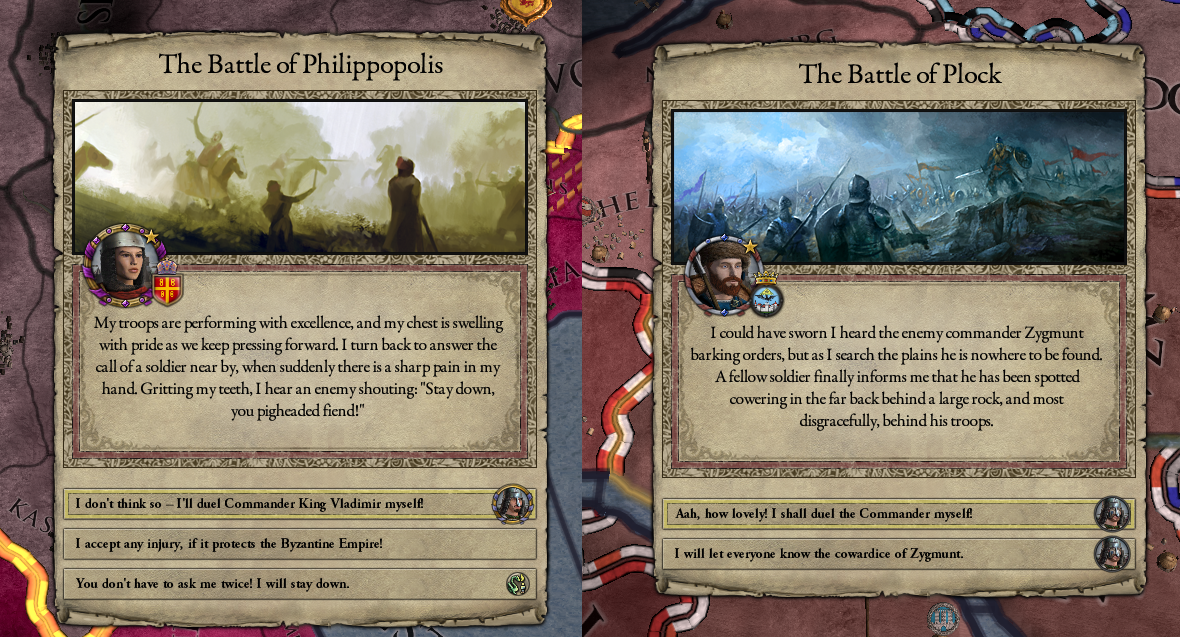
BATTLE EVENTS
All the original vanilla events that fire from being in a battle (from the on_combat_pulse) have been replaced. Leading troops should be fun. And it should be varied, and not always end up with a hit on the head, leaving you Incapable for 40 years while your clueless regent runs amok at court. That does not mean we have removed risk from the equation, but one major change is that you should now have some choice in how you tackle events on the battlefield. If you want, you can accept certain injury, but quite often, if you’re feeling bold, you will be able to charge after the enemy commander, for a battlefield duel. Which events you end up getting is also going to vary, depending on how much soldier material you’re made of. Not all enemies are going to be climbing up the nearest tree when they see you, and if you don’t own any artifacts, you can’t throw them away to distract your greedy enemy… And only a cat owner can find their kitten curled up, hiding in their saddlebags.
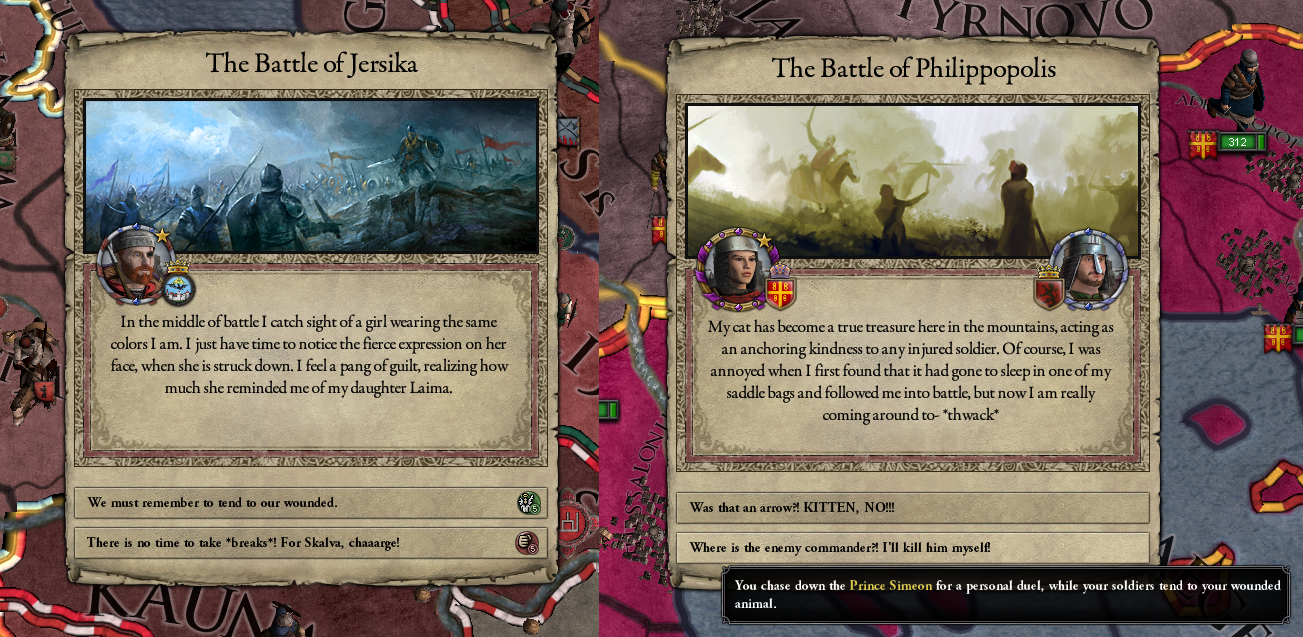
As a liege, you will as usual be alerted to certain events on the battlefield, except you will now get a little bit more insight into how the character met their end:
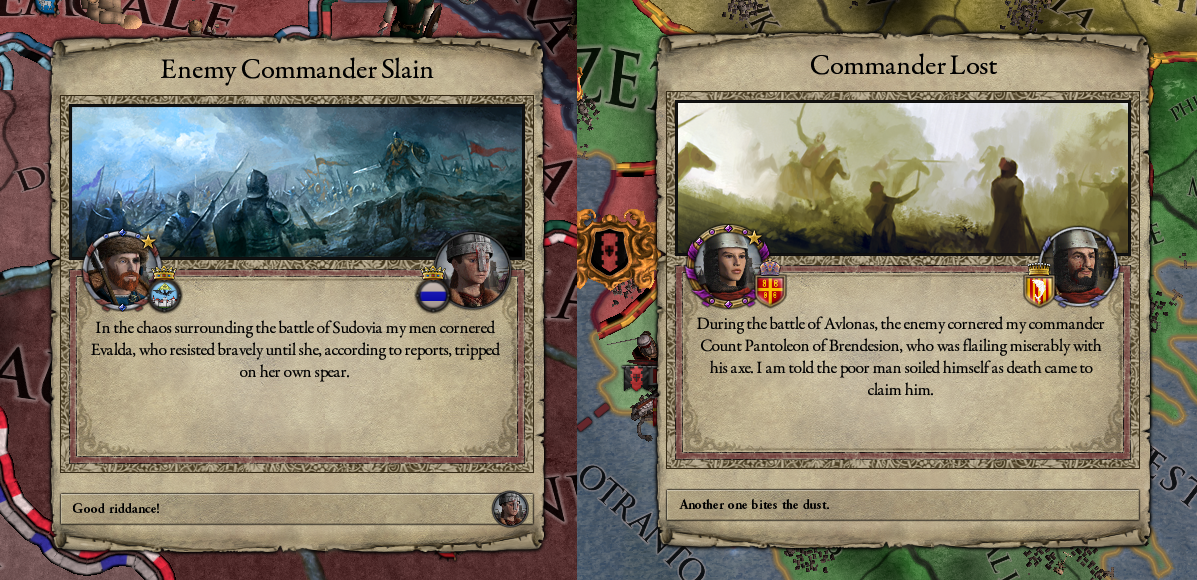
SCARS AND TATTOOS
All of these events will be accompanied by several new portrait-related upgrades.
First of all, the Scarred trait and its visuals have been completely overhauled: the original Scarred trait is now only the first in a three-tiered system. Whenever a character is injured during a duel or battle, a hidden scar-variable will increase, which, past a certain threshold will allow them to proceed from Scarred, to Grievously Scarred and, finally, to Horrifically Scarred, with each trait granting different perks and different visuals.
Additionally, rather than having the portrait effect result in one scar, picked from a pool of three, we made it so that when a character receives their first scar, it is tied to one out of ten different scar types, determined by a random hidden trait, and it is along this hidden path that the scarring progresses. Each kind has its own evolution when moving to the next stage of scarring, making sure to significantly reduce the chance of two scarred characters sporting the same visual effect on their portrait.

Aside from this new system, in order to make portraits even more varied and dynamic, several new temporary (and permanent) visual effects have been added, including visuals for minor injuries, like a Black Eye or Concussion, but also Harelip (the trait), and freckles (from a hidden inheritable trait available to certain graphical cultures only). Some characters might even come with blood splatter on them, signalling a recent duel or battlefield event.
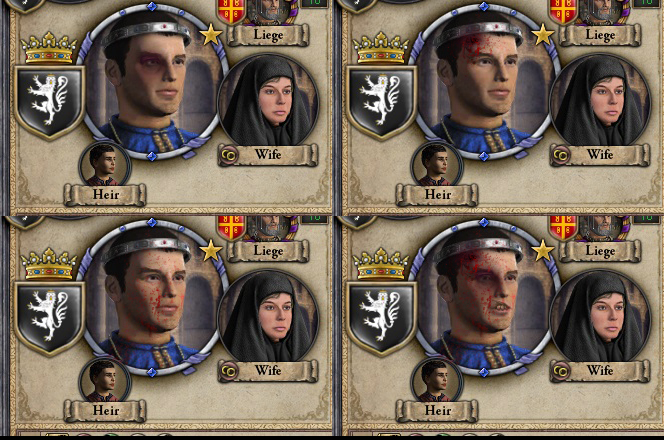
Finally, some Warrior Lodge Powers and religions now grant access to warpaint and tattoo effects. The main difference between the two in gameplay terms is that warpaint is temporary, while tattoos are permanent. While they come in different shapes and color, they are mainly tied to the religion (or Warrior Lodge) of the character.
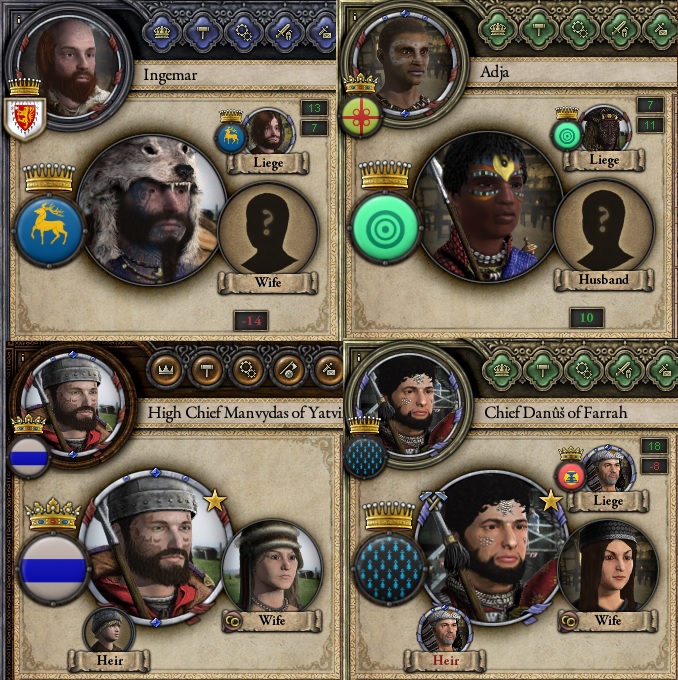
To be clear: most of the new battle events are in in the free patch (along with battlefield duels), as old events have been removed. There is a batch of new ones that tie into the new Warrior Lodge society type and are thus Holy Fury exclusive, but the Personal Combat Rating rebalance (along with updates to old events that make use of any type of duel) is going to be available without the DLC. The decision to Duel a character when you right-click them will remain accessible via the Way of Life DLC, or through being a Warrior Lodge member, using Holy Fury.
All in all, we hope you will send your ruler into battle more often and that you will have more memorable encounters with your enemies when you do so. Here are some of our favorites:
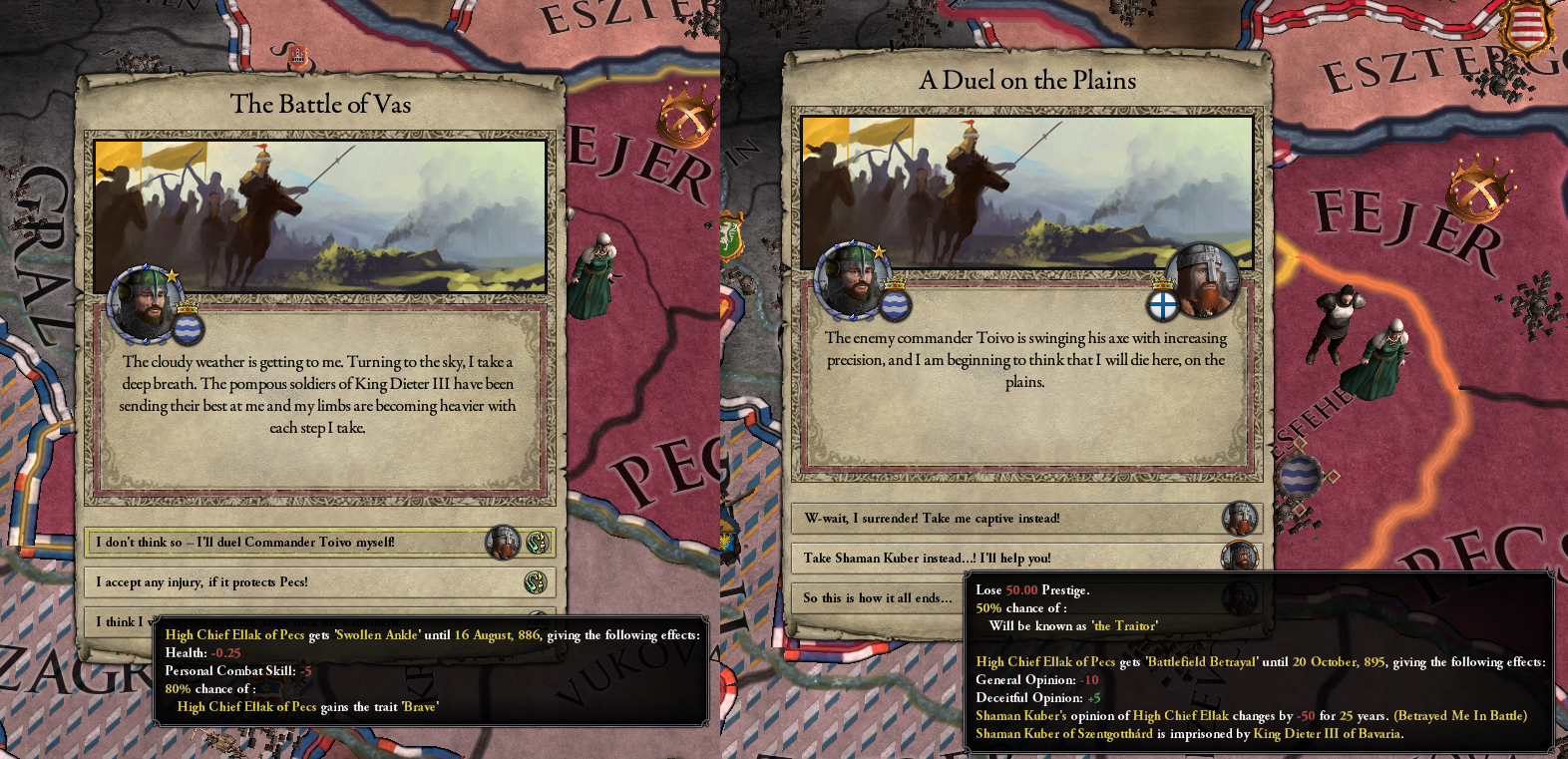
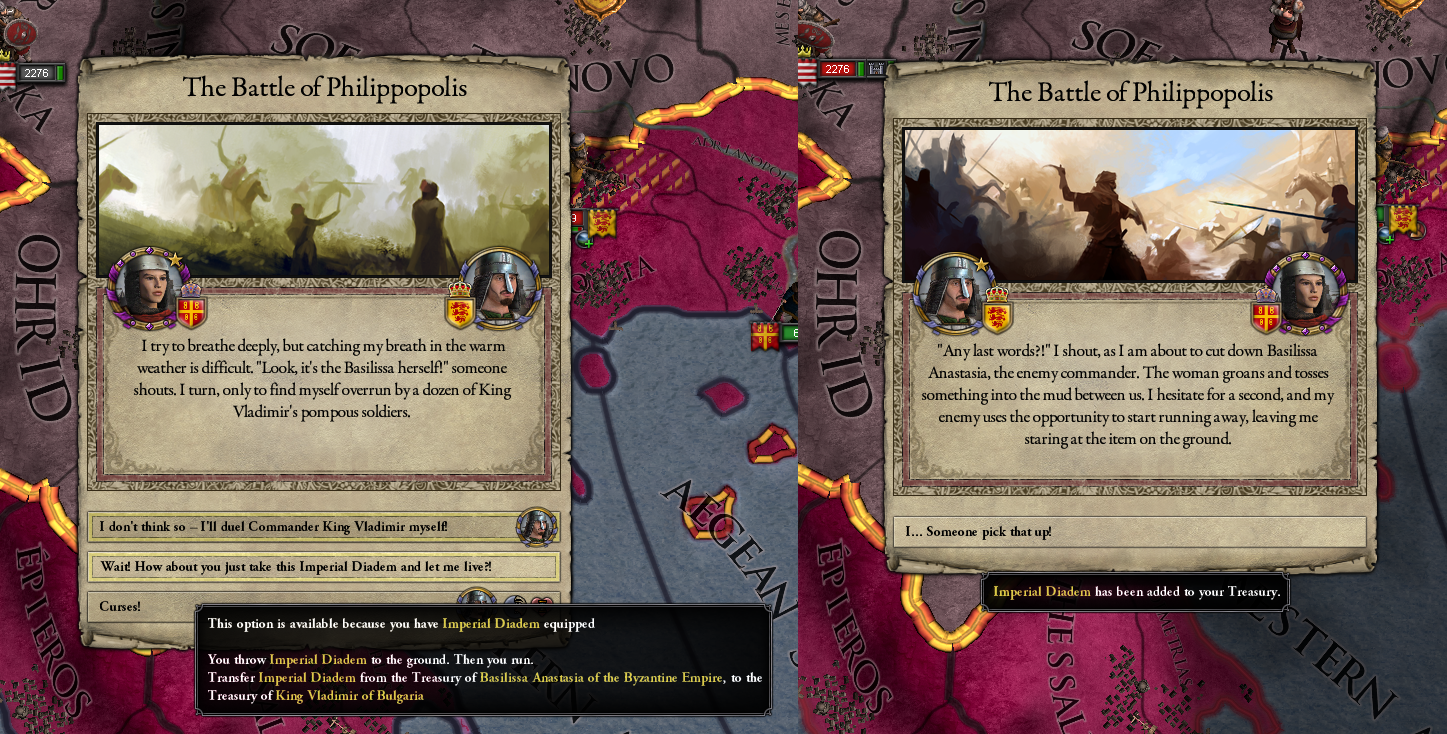
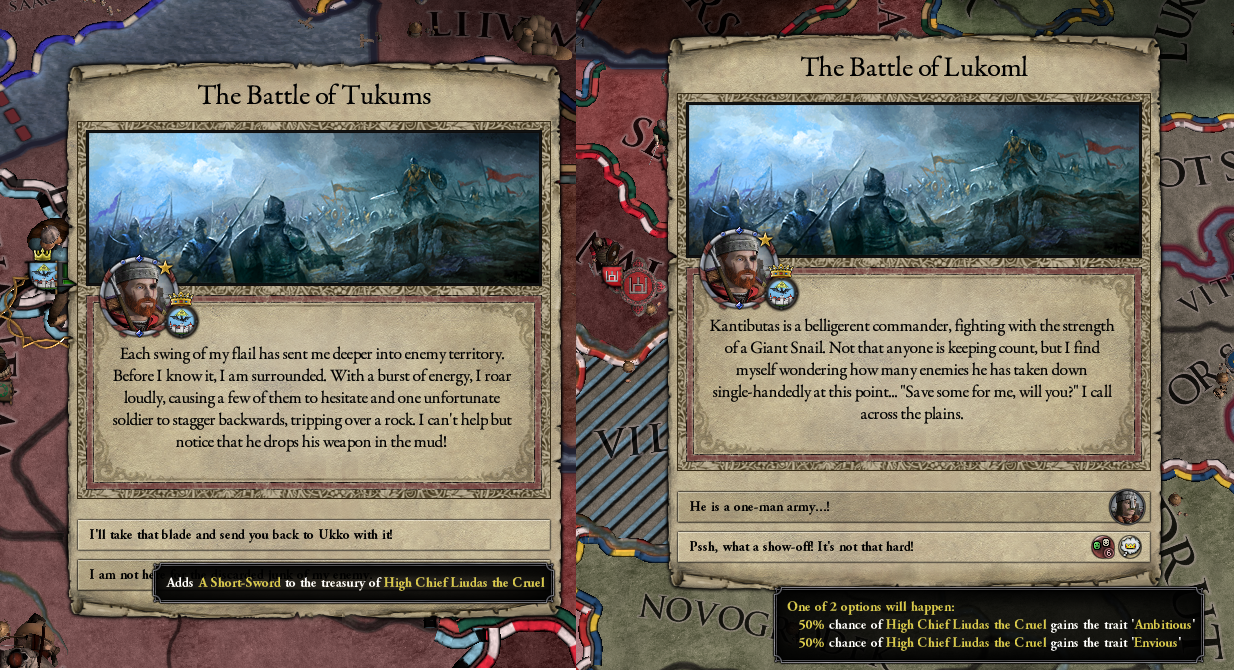

Thank you for reading.
Dev Diary #100, and we have a bunch of fun things to talk about!
DUELS
As we have mentioned before, duels have been reworked during this development cycle, along with some other systems that tie into it. First off, Personal Combat Ratings now more commonly range between something like 1-100, and traits and other modifiers have been rebalanced to accommodate for this system overhaul. Naturally, being sick or bedridden can drop that number down far below zero, and if you have been Severely Injured, you should probably rest up before you accept a new fight. There are also degrees of injury when you fight, so you don’t always end up losing limbs left and right… Instead, you might be allowed to walk away with a temporary modifier, such as a Swollen Ankle, or a Black Eye.

Our hope is that dueling another character will be something you remember. Of course, the result of a duel is determined by your Personal Combat Rating, but other factors, such as your current mood (is your character Stressed or Depressed?), or your personal relationship to your target (is this your rival, or someone you’re attracted to?) are also part of the evaluation. Players who enjoy intrigue will also find that it is not only pure Martial characters who can be successful in one-on-one combat. Be aware, however, that such attacks can be safeguarded against, depending on the Intrigue of your target, or if they have a sympathetic Spymaster who is more competent a schemer than you.
When it comes to the text, we have, in addition to triggered descriptions, used a lot of dynamically generated sentences. This in order to, among other things, highlight the terrain you’re fighting in, or making sure that, as you strike your enemy down, your equipped weapon can be referred to by name (and that it uses the correct type of attack when you do - eg: blunt weapons do not generally “cut/slice/slash” at the enemy).
Once these new and fanciful duels began to make it into the game, we quickly realized that we wanted them to occur in battles too. Bringing me to our next point: battle events.

BATTLE EVENTS
All the original vanilla events that fire from being in a battle (from the on_combat_pulse) have been replaced. Leading troops should be fun. And it should be varied, and not always end up with a hit on the head, leaving you Incapable for 40 years while your clueless regent runs amok at court. That does not mean we have removed risk from the equation, but one major change is that you should now have some choice in how you tackle events on the battlefield. If you want, you can accept certain injury, but quite often, if you’re feeling bold, you will be able to charge after the enemy commander, for a battlefield duel. Which events you end up getting is also going to vary, depending on how much soldier material you’re made of. Not all enemies are going to be climbing up the nearest tree when they see you, and if you don’t own any artifacts, you can’t throw them away to distract your greedy enemy… And only a cat owner can find their kitten curled up, hiding in their saddlebags.

As a liege, you will as usual be alerted to certain events on the battlefield, except you will now get a little bit more insight into how the character met their end:

SCARS AND TATTOOS
All of these events will be accompanied by several new portrait-related upgrades.
First of all, the Scarred trait and its visuals have been completely overhauled: the original Scarred trait is now only the first in a three-tiered system. Whenever a character is injured during a duel or battle, a hidden scar-variable will increase, which, past a certain threshold will allow them to proceed from Scarred, to Grievously Scarred and, finally, to Horrifically Scarred, with each trait granting different perks and different visuals.
Additionally, rather than having the portrait effect result in one scar, picked from a pool of three, we made it so that when a character receives their first scar, it is tied to one out of ten different scar types, determined by a random hidden trait, and it is along this hidden path that the scarring progresses. Each kind has its own evolution when moving to the next stage of scarring, making sure to significantly reduce the chance of two scarred characters sporting the same visual effect on their portrait.

Aside from this new system, in order to make portraits even more varied and dynamic, several new temporary (and permanent) visual effects have been added, including visuals for minor injuries, like a Black Eye or Concussion, but also Harelip (the trait), and freckles (from a hidden inheritable trait available to certain graphical cultures only). Some characters might even come with blood splatter on them, signalling a recent duel or battlefield event.

Finally, some Warrior Lodge Powers and religions now grant access to warpaint and tattoo effects. The main difference between the two in gameplay terms is that warpaint is temporary, while tattoos are permanent. While they come in different shapes and color, they are mainly tied to the religion (or Warrior Lodge) of the character.

To be clear: most of the new battle events are in in the free patch (along with battlefield duels), as old events have been removed. There is a batch of new ones that tie into the new Warrior Lodge society type and are thus Holy Fury exclusive, but the Personal Combat Rating rebalance (along with updates to old events that make use of any type of duel) is going to be available without the DLC. The decision to Duel a character when you right-click them will remain accessible via the Way of Life DLC, or through being a Warrior Lodge member, using Holy Fury.
All in all, we hope you will send your ruler into battle more often and that you will have more memorable encounters with your enemies when you do so. Here are some of our favorites:




Thank you for reading.

